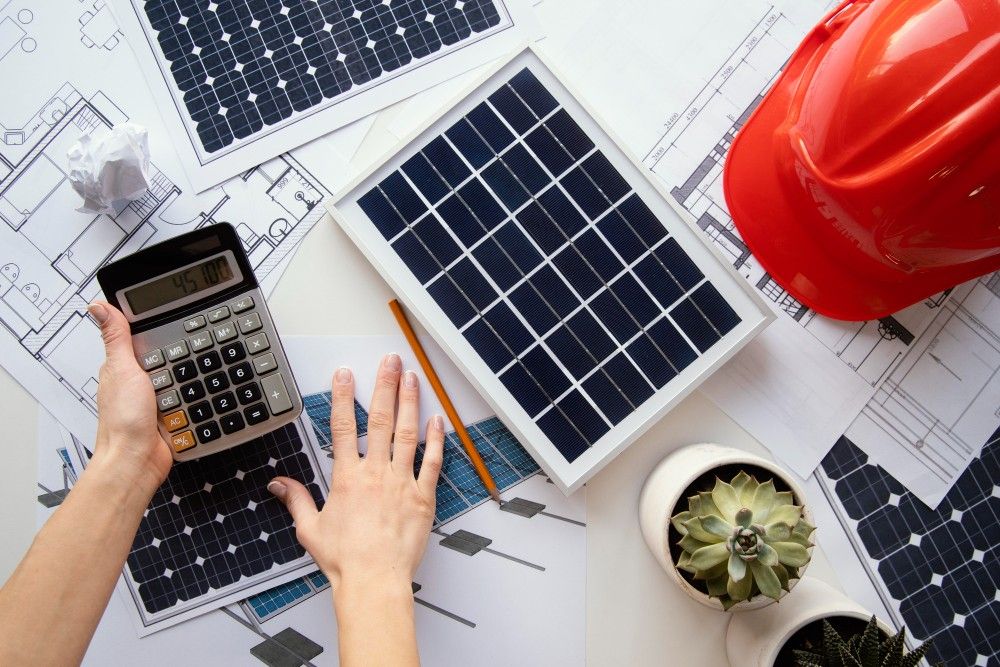
The True Cost of Setting Up a Solar Panel Manufacturing Plant in India
Since renewable energy is becoming more popular, the demand for solar panels has grown exponentially. India, with its vast potential for solar energy, is becoming a key player in the global solar manufacturing market.
Setting up a solar panel manufacturing plant in India is an attractive business venture, but understanding the associated costs is essential for any business looking to enter the market.
This article will explore the cost of setting up a solar panel manufacturing plant in India, covering key aspects like land, machinery, labor, regulatory compliance, and other considerations.
By the end of this guide, you will have a clear understanding of the expenses involved and the financial planning needed to start this business.
Key Factors Affecting the Setup Cost
Setting up a solar panel manufacturing plant involves significant investment, and understanding the factors that affect the cost is crucial to making an informed decision.
Let’s break down the key components of the cost structure.
1. Land and Infrastructure Costs
The first major expense is acquiring land for the plant. The cost of land will vary significantly depending on the location. Industrial zones or Special Economic Zones (SEZs) offer tax incentives, but the price of land may still be high in areas with good connectivity and infrastructure.
On average, industrial land in India can cost anywhere from INR 500 to INR 3,000 per square meter, depending on the proximity to urban centers, transportation hubs, and other logistical factors.
Additionally, the cost of constructing the facility itself must be accounted for. The plant needs to be equipped with specialized spaces for manufacturing, storage, quality testing, and office spaces, all of which add to the initial investment.
2. Machinery and Equipment
The cost will vary depending on the Original Equipment Manufacturer (OEM) chosen, as different manufacturers offer varying price points and specifications for their machinery.
While it’s challenging to provide exact figures due to this variability, prospective investors should conduct thorough research on OEM options to find machinery that fits their budget and production needs.
3. Raw Materials
The cost of raw materials is another significant consideration. The primary raw materials needed to manufacture solar panels include silicon, glass, aluminum frames, backsheet materials, and electrical components.
Silicon, which is used to make the photovoltaic cells, can make up a large portion of the raw material costs. The price of silicon can vary based on market conditions, but it typically costs around INR 200-300 per kg.
Overall, the cost of raw materials for a medium-sized plant can range from INR 5 to 10 crores annually, depending on the scale of production and the supplier chosen.
4. Labor Costs
Labor costs in India are relatively low compared to other countries, but they are still an essential factor to consider. The workforce required for a solar manufacturing plant includes skilled technicians, engineers, assembly line workers, quality control inspectors, and administrative staff.
On average, skilled workers in India may earn between INR 15,000 to INR 50,000 per month, depending on their role and experience. For a manufacturing plant, you would typically need between 50-150 workers for a medium-sized facility.
Labor costs can vary depending on the region, as wages are often higher in urban centers compared to rural areas.
5. Regulatory and Compliance Costs
Setting up a solar manufacturing plant requires approvals from several government departments, including the Ministry of Environment, Forest and Climate Change for environmental clearances, the Ministry of Heavy Industries for factory licenses, and local authorities for building permits.
Additionally, compliance with quality standards, such as ISO certification, can add to the overall cost. Regulatory and compliance-related expenses typically amount to INR 50 lakhs to INR 1 crore or more, depending on the plant’s scale and the certifications required.
6. Energy and Utility Costs
Since solar panel manufacturing involves energy-intensive processes, the cost of electricity and other utilities must be factored into the operational expenses. India’s electricity prices can vary from state to state, with average costs ranging from INR 5 to INR 10 per unit.
Many manufacturers opt to set up on-site solar power generation to reduce electricity costs and align with sustainability goals. The installation of a solar power system for self-consumption can cost anywhere from INR 50 lakhs to INR 5 crores, depending on the size of the facility.
7. Marketing and Distribution Costs
Once the plant is operational, the next step is marketing and distribution. While solar panels are in high demand, effective marketing is crucial for standing out in a competitive market. Distribution costs depend on the channels used to reach customers, including domestic and international markets.
The cost of marketing and distribution typically represents around 5-10% of the annual operating budget of the plant.
Financing Options for Solar Panel Manufacturing Plant
Setting up a solar manufacturing plant requires substantial capital investment. Several financing options are available to investors looking to fund the project:
1. Bank Loans and Financing
Indian banks and financial institutions offer loans for manufacturing projects, especially if the business falls under the priority sector or green energy categories.
The National Solar Mission and other government initiatives provide low-interest loans and grants for renewable energy projects.
2. Government Incentives and Subsidies
The Indian government offers several incentives under the Production Linked Incentive (PLI) scheme, which provides financial support for manufacturing solar panels, modules, and cells in India.
Additionally, tax exemptions and duty reductions for raw materials can help reduce initial costs.
3. Private Investment
Private equity and venture capital funds are increasingly interested in the renewable energy sector, making it easier for solar manufacturing plants to secure investment.
Many international companies also invest in India’s solar market due to the country’s growth potential.
Strategic Planning is Key to Success
Manufacturing solar panels in India is a lucrative venture, as domestic and global consumers demand renewable energy solutions.
However, the costs associated with land, machinery, raw materials, labor, and compliance can be significant. Careful financial planning, government support, and strategic location choices are essential to minimize costs and ensure a successful operation.
If you’re considering setting up a solar manufacturing plant in India, VMS Consultants can help. We offer comprehensive engineering, architecture, and project management services to guide you through the process from start to finish.
Contact us today to turn your solar manufacturing vision into reality.





